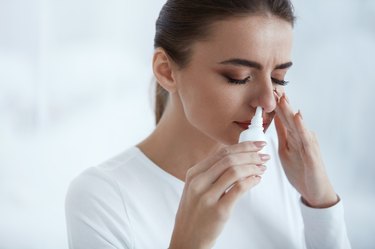
Next time you wake up with a stuffy nose and you head to the drugstore for an over-the-counter cold medication, you may want to check the ingredient list. If you pick a product containing phenylephrine, a common nasal decongestant, you might not get much relief.
In fact, the FDA announced in November 2024 that it wants to pull oral phenylephrine from store shelves because it's ineffective.
Video of the Day
Video of the Day
"An FDA advisory panel recently concluded that the standard oral dose of phenylephrine is no better than taking a placebo when treating nasal congestion," says Jacqueline H. Cleary, PharmD, associate professor of pharmacy practice at Albany College of Pharmacy and Health Sciences.
Here's what that means for your cold symptoms — and the alternatives to phenylephrine you can try instead.
What Is Phenylephrine?
Phenylephrine is a type of nasal decongestant medication taken orally. You can find it as a solo med in products like Sudafed PE (not regular Sudafed) and Suphedrine PE, or combined with other meds in products like Alka-Seltzer Plus Severe Cold, Robitussin Cough and Cold CF, Theraflu Daytime Severe Cold and Cough, Tylenol Cold + Flu Severe and Vicks DayQuil Cold & Flu, among others, according to the National Library of Medicine (NLM).
Phenylephrine was originally thought to ease congestion by reducing swelling in the nasal passages. "When your nose gets congested, blood vessels in the nose dilate and close up the nasal passages," says Randall Tackett, PhD, professor of clinical and administrative pharmacy at the University of Georgia. Phenylephrine "causes the blood vessels to constrict, and that opens you up."
That's the theory anyway. In practice, research has shown that even though phenylephrine does cause some nasal blood vessel constriction, it doesn't actually un-stuff you.
"Once ingested, the stomach breaks down oral phenylephrine tablets so much that it's inconsistently — if at all — absorbed into the bloodstream, which would allow the medication to then work as a decongestant," says Deanna Tran, PharmD, associate professor in the Department of Practice, Sciences, and Health Outcomes Research at the University of Maryland School of Pharmacy.
Risks of Phenylephrine
Oral phenylephrine isn't harmful when used as directed. It also has a pretty mild side effect profile — think dizziness, trouble sleeping or nervousness, per the NLM.
It just doesn't work, so there's no reason to take it (or spend money on it).
"Overall, it does have a good safety profile, but why take a drug and risk exposure when the clinical efficacy of it helping the condition is lacking?" Cleary says.
Should You Stop Using Phenylephrine?
The FDA hasn't actually announced when it will call for phenylephrine sales to stop. So for now, it's still easy to find meds made with the ingredient on store shelves. But that doesn't mean you should buy them, experts say.
"I don't buy them. The reality is, I know that they're pretty ineffective," Tackett says.
You can check to see if a product contains phenylephrine by reading the list of active ingredients. If the only active ingredient is phenylephrine, ask your pharmacist for a more effective alternative (more on those in a minute). If it's a combination product containing phenylephrine and other active ingredients, it still may be worth a try, because you may get relief from the other ingredients, Tran notes.
What About Nasal Phenylephrine?
The FDA's announcement only applies to oral forms of phenylephrine.
"There are other forms of phenylephrine, primarily phenylephrine in nasal spray formulations, that is both safe and effective," Tran says. (You'll find nasal phenylephrine in sprays like Neo-Synephrine and Pretz-D, per the Mayo Clinic.)
Medication Alternatives for Managing Cold Symptoms
There are OTC meds other than phenylephrine that you can turn to for curbing congestion, according to the FDA. Some effective options include:
- Pseudopehedrine (Sudafed): It's a go-to oral option for Tackett and Tran. Medications containing pseudoephedrine are available behind the counter, so you'll have to ask the pharmacist, show ID and sign for it. But you don't need a prescription.
- Oxymetazoline (Afrin): For instant de-stuffing, try a nasal spray like oxymetazoline, which is available over-the-counter in Afrin ($7.79, Amazon). Just keep in mind that you shouldn't use nasal spray daily; only use it for a few days at a time. When used for longer, it can actually end up making your congestion worse, Tran says.
- Steroid nasal sprays: If you think your congestion is caused by allergies, meds like fluticasone, budesonide or triamcinolone (Nasacort) can help, Tran notes. (They won't work for colds.) FYI, they can take a week or two of daily use to fully kick in, according to Mount Sinai. Consider these picks:
- HealthA2Z Fluticasone Propionate Nasal Spray ($14.95, Amazon)
- Equate Budesonide Nasal Spray ($19.38, Walmart)
- Nasacort Allergy Nasal Spray ($18.06, Amazon)
Home Remedies for Congestion
Whether you'd prefer to skip decongestants altogether or you want to give your med an extra boost, Tran recommends some more ways to un-stuff your nose and feel more comfortable.
- Steam inhalation: Warm vapor from a hot shower or a bowl of hot water helps loosen mucus, which can relieve congestion.
- Saline nasal sprays or rinses: A neti pot or saline rinse bottle clears congestion-causing mucus while moisturizing your nasal passages.
- Warm compress: Drape a warm, damp washcloth over your sinuses to reduce swelling and ease pressure.
- Humidifier: It adds moisture to the air to prevent your nasal passages from getting too dry, which can reduce irritation and discomfort.
- Extra pillows: Sleeping with your head elevated encourages mucus to drain, which can help ease stuffiness.
- Lots of fluids: Staying hydrated thins mucus in your nasal passages so it drains easier. Water, hot tea, warm broth or juice are all good choices.
- U.S. Food and Drug Administration: "FDA Proposes Ending Use of Oral Phenylephrine as OTC Monograph Nasal Decongestant Active Ingredient After Extensive Review"
- National Library of Medicine: "Phenylephrine"
- Mayo Clinic: "Phenylephrine (nasal route)"
- U.S. Food and Drug Administration: "Key Information about Nonprescription, Over-the-Counter (OTC), Oral Phenylephrine"
- Mount Sinai: "Nasal corticosteroid sprays"
Was this article helpful?
150 Characters Max
0/150
Thank you for sharing!
Thank you for your feedback!
Is this an emergency? If you are experiencing serious medical symptoms, please see the National Library of Medicine’s list of signs you need emergency medical attention or call 911.




